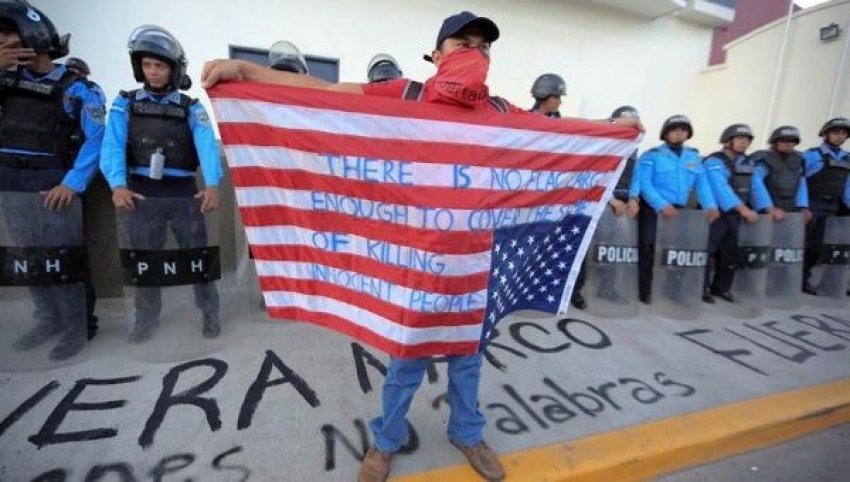
At least six people were wounded in clashes between police and protesters in Honduras on February 27 as protesters voiced their opposition to the visit of United States Ambassador to the United Nations Nikki Haley, and her country's support for President Juan Orlando Hernandez, who was re-elected amid electoral fraud allegations last November.
Hundreds of protesters gathered near the United Nations office in the capital, Tegucigalpa, to protest Haley’s visit. They burnt tires and carried coffins and crosses in memory of the almost 40 people who have died during protests following Hernandez's re-election.
Haley visited the Central American country to back Hernandez as president of Honduras and as a friendly gesture of his support for US foreign policy in the Middle East.
“I want to thank the president and the Honduran people for their support of our decision to move the Embassy to Jerusalem,” declared Haley on the first day of her two-day visit.
Hernandez also asked Haley to extend the Temporary Protected Status for Hondurans in the US, to temporarily prevent the deportation of about 60,000 Hondurans.
The protest was led by former opposition candidate Salvador Nasralla and his campaign coordinator and former president Manuel Zelaya.
The Honduran opposition claims Hernandez was re-elected in a fraudulent electoral process, in which he suddenly had the lead after the ballot counting system crashed for several hours.
The clashes with police came a day after 58 Honduran civil society organisations denounced Hernandez at the Inter American Commission for Human Rights for further concentration of power to control the country’s key institutions.
The groups that filed the complaint, the Coalition Against Impunity in Honduras and the Centre for Justice and International Law (CEJIL), claim that the concentration of power explains why the Constitutional Chamber of the Supreme Court of Justice allowed Hernandez to run for re-election, modifying a constitutional provision in place since 1982.
The attempt by Zelaya to rewrite Honduras’ constitution through a public national referendum in 2009 concluded with a coup d'etat after several institutions, including the Supreme Court of Justice, declared the referendum illegal.
The Coalition and CEJIL also denounced the state repression and militarisation that followed the controversial presidential elections last November.
As proof of state repression, the organisations cited the following numbers: 192 demonstrations repressed, 1257 people detained, 38 deaths, 76 victims of torture, 393 wounded in protests, 105 displaced due to violence, 15 journalists attacked and 73 victims of threats.
Alarm over state violence in Honduras is not new, nor is it confined to Honduran civil society. Last month, the UN echoed complaints filed by human rights organisations asking the Honduran government to refrain from deploying military forces against protesters.
[Compiled from TeleSUR English.]
Like the article? Subscribe to Green Left now! You can also like us on Facebook and follow us on Twitter.